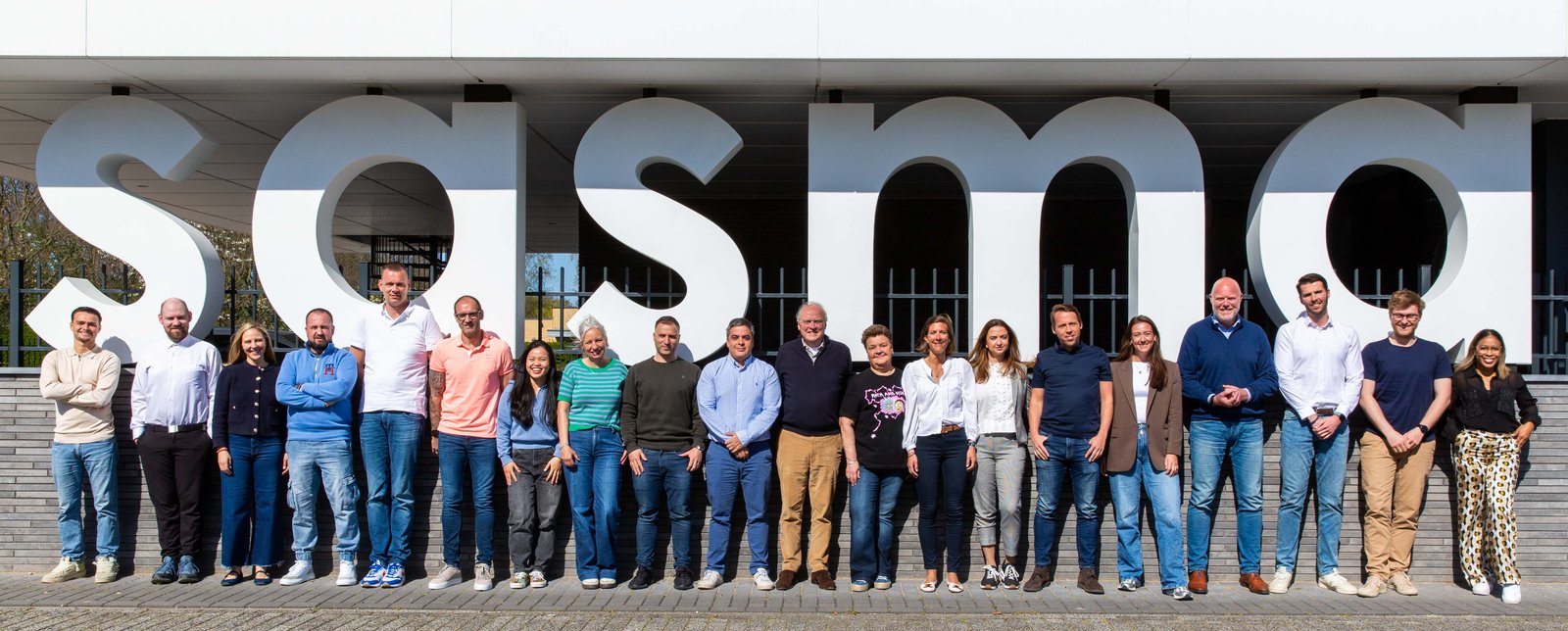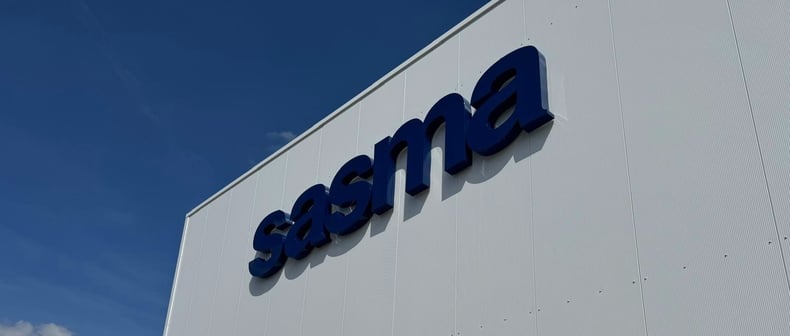
evofenedex: Training Increases Efficiency at Wholesaler Sasma
Sasma: From Small Wholesaler to Market Leader
Over the past 23 years, Sasma has evolved from a small bulk alcohol wholesaler into a market leader. The Dutch family-owned company now employs 21 staff members and operates in nearly every country. “We supply customers across various industries, including the beverage sector, electronics, medical, and cosmetics,” says Logistics Manager Pim Schouten. “Our clients are primarily wholesalers, bottlers, and distilleries. We collaborate with suppliers from countries like Brazil, Colombia, Pakistan, and Poland. From our office in Zoetermeer, we manage all aspects necessary to ensure our international trade transactions proceed smoothly and on time. The logistics department and traders handling purchasing and sales are based here, while physical order processing occurs at our warehouse in Antwerp.”
Emphasizing Professionalism Through Training
Sasma has experienced significant growth, particularly in the last five years, during which the number of employees has doubled. Schouten notes, “This expansion necessitates increased professionalism and structured procedures. It's crucial that employees understand their tasks and the reasons behind specific processes. Working with excise goods and hazardous materials is not trivial; mistakes can have serious consequences.”
To address this, Sasma initiated training for its logistics staff five years ago. As of this year, in-company training sessions provided by evofenedex have become mandatory for all employees. Every two years, staff members participate in training covering topics such as ICC Incoterms® 2020, letters of credit (L/C), origin, customs documents, excise goods, and hazardous materials. Schouten emphasizes the importance of regularly refreshing knowledge to prevent complacency and ensure that employees remain vigilant and informed.
Tailored Training for Diverse Roles
Recognizing the varied needs of different departments, Sasma organizes separate training days for logistics personnel and other staff members. This approach allows for more in-depth exploration of topics relevant to each group's responsibilities. The decision to mandate certain training sessions for all employees also aligns with Sasma's certifications, including ISO, which require regular (re)training of staff.
For those handling hazardous materials, these training sessions are particularly critical. Each session revisits fundamental principles, such as proper handling procedures and associated documentation and regulations. Schouten believes that fostering a deeper understanding of these subjects is more beneficial than merely following procedures without comprehension.
Reducing Errors and Enhancing Efficiency
The training programs have led to a noticeable decrease in errors, saving both time and costs. Schouten explains, “Even a minor mistake in the documentation for a shipment of hazardous materials can result in delays and expenses, such as a thousand-dollar fee if the shipment is held at the port. Minimizing errors is also essential when dealing with letters of credit. Mistakes in this area can cause significant issues. Thanks to the training, our colleague responsible for L/Cs now prepares them accurately and promptly, ensuring bank acceptance and preventing shipment delays.”
Raising Awareness Across Departments
Schouten believes that all employees, including those in sales, benefit from understanding the entire process. “When selling a product, it's important to have basic knowledge of the documentation process. Sales staff should verify whether the customer has an import license, for example. Otherwise, we might receive orders that we cannot fulfill. It's about awareness—knowing what to pay attention to. I often tell my team: 'Your work becomes more enjoyable when you understand what you're doing and why it's important.'”
While some employees may initially be reluctant to participate in mandatory training, Schouten observes that they often find value in the sessions afterward. “They might say, 'I already know this,' but after the training, they realize they've gained new perspectives and insights. Knowledge can fade over time, so regular training is essential.”
Improved Performance and Customer Support
Ultimately, the training programs have made Sasma's employees more efficient. Schouten notes that, in addition to reducing errors, staff members work 10 to 20 percent faster and are more adept at preparing documents. The training also enables them to better support colleagues and customers, allowing Sasma to manage the entire process from start to finish, providing comprehensive service.
Schouten appreciates that evofenedex tailors the training to Sasma's specific needs. “It's highly customized. By providing our own cases and document examples beforehand, the training addresses exactly what we do. It's also helpful that the same instructors often lead the sessions, as they are familiar with our company and products. Additionally, we can consult evofenedex for our queries. For instance, an evofenedex business advisor prepares our Material Safety Data Sheets (MSDS), preventing border delays and ensuring smooth delivery of our ethanol shipments.”
Adapting to Local Conditions
Moon Nguyen, Logistics & Procurement Coordinator at Sasma, now pays closer attention to local conditions when agreeing on ICC Incoterms® 2020. “Assessing solely based on costs or risks is insufficient. We must also consider geographical challenges at the loading location and destination to determine the most suitable Incoterms® rule for different orders.”
Awareness and Practical Understanding
When asked whether the training topics are useful for departments like sales, Schouten answers with a firm yes.
“My opinion is that if you're selling something, you should also have basic knowledge of the entire documentation process. It’s important that sales knows why they need to check whether the customer has an import license. Otherwise, I end up with an order on my desk that we can’t process. It’s all about awareness—knowing what to look out for. I often tell my team: ‘Your job becomes more enjoyable when you better understand what you’re doing and why it matters.’”
Not all employees are initially excited about the mandatory training sessions.
“Sometimes I get responses like, ‘I already know all this.’ And after the training, they’ll say things like, ‘I didn’t get much out of it, it was a bit boring.’ But even if it’s subconscious, they do benefit from it because they start looking at things differently and know what to watch for. Knowledge does fade over time, which is why regular training is so important.”
Practical Impact: Fewer Errors, More Speed
“We make fewer mistakes when preparing orders.”
– Moon Nguyen, Logistics & Procurement Coordinator at Sasma
Schouten observes that training has made employees much more efficient.
“In addition to reducing mistakes, people are working 10 to 20 percent faster. They become more skilled at drafting documents. And through the training, they can support colleagues and customers better. Ideally, we take care of everything from A to Z for them, so they’re fully unburdened.”
He appreciates that evofenedex offers highly tailored training.
“It’s very custom-made. We can send case studies and examples of our documents in advance, so the sessions directly address what we do. It also helps that often the same instructors return—they’re already familiar with our company and products. We can also approach evofenedex with questions. One of their business advisors prepares our Material Safety Data Sheets (MSDS), and a safety advisor performs our annual audit, which is mandatory for companies trading in hazardous goods.”
Local Conditions Matter
Sasma colleagues Mitchell Stouthart (Sales Africa) and Moon Nguyen (Logistics & Procurement) both joined the conversation, having taken several trainings over recent years.
“The Incoterms® training helped me especially to apply ICC Incoterms® 2020 correctly in shipments to Africa,” says Stouthart.
“Customs procedures vary widely across African countries, and clients expect clear information about who is responsible for what. Thanks to the training, I now better understand how to adapt delivery terms to local situations. This helps avoid border delays and ensures smooth delivery of our ethanol shipments.”
Nguyen adds: “A judgment based only on cost or risk isn’t enough. We also have to consider geographical challenges at both the loading site and the destination to decide which Incoterms® rule fits best. For example, I recently recommended using Delivered at Place (DAP) instead of Ex Works (EXW) in a contract because the buyer lacked experience with local loading and customs procedures—something I might have overlooked before. Some clients are unaware of their own country’s import process. Offering DAP can ensure smoother handling.”
Collaboration and Customer Focus
“I now understand better how to align delivery terms with local conditions.”
– Mitchell Stouthart, Sales Africa at Sasma
Both Stouthart and Nguyen agree the trainings improved collaboration across departments.
Nguyen: “Thanks to the origin training, I can better advise sales on the most accurate origin information for our products. It’s complex for us because we import multiple ingredients and manufacture in a different country.”
Stouthart: “In sales, we work closely with logistics and export documentation teams. The trainings improved our communication with colleagues and helped us anticipate what’s needed for shipping and documents. This boosts our collective strength, especially in complex markets like Africa.”
Nguyen adds: “With more knowledge of trade and logistics, I can better identify Sasma’s responsibilities and logistics processes. And we make fewer mistakes in drafting orders.”
Stouthart continues: “It also provides more confidence when preparing quotes. Clients in Africa often expect us to handle everything, while responsibilities can differ depending on the Incoterms® rule used. The customs training helps us explain this professionally and justify it legally, preventing disputes and surprise costs for clients.”
A Valuable Support Line
Stouthart especially values the ability to reach out to instructors after training.
“We had follow-up contact about a shipment to Kenya, where it wasn’t clear who was responsible for clearance costs. We got a quick, helpful answer. It felt like a valuable support line—even after the training.”
In Closing: Training Leads to Understanding and Results
Schouten concludes by emphasizing how his colleagues’ experiences show that the trainings lead to greater understanding.
“As mentioned before, they make fewer or no mistakes. They’re also better able to support colleagues and clients. That’s what this is all about. And indirectly, it saves time and money.”
This article is an English translation of an interview from Dutch entrepreneurs' association evofenedex’s Globe Magazine. Read the original here.
Related articles
-

Meet Sasma’s New Warehouse Manager in Halsteren
Mark shares his background, his vision for safe & efficient operations, and how Halsteren will serve as a natural...Read more -

Is Ethyl Alcohol Halal?
Ethyl alcohol is widely used acrossmany supply chains, where it primarily serves as a functional ingredient rather than...Read more -

Sasma 2025 Year in Review
As we close out Q3, we share the key developments shaping our industry: global trade agreements & tariff shifts,...Read more -

Sasma Halsteren Facility On Track To Open April 2026
Sasma’s new Halsteren warehouse is progressing as planned, marking a significant investment in our long-term...Read more -

Exploring Bulk Whisky with Sasma: Quality, Customization, & Expertise
Understanding the factors shaping bulk alcohol pricing is crucial. Learn how raw materials, production processes, and...Read more -
.jpg?width=790&height=980&name=sasma-apr25-websize-366%20(1).jpg)
What Is A CAS Number and Why Is It Important?
Quality at Sasma more than a standard we adhere to. we're suppliers of bulk spirits & alcohol, from sourcing and...Read more

